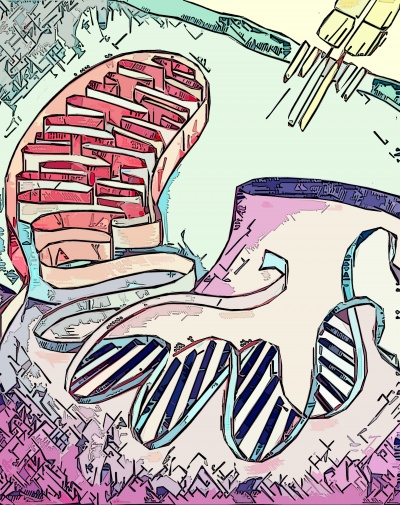 |
The goal of the J. Rathmell lab is to establish the regulation and role of metabolic pathways in lymphocyte activation, differentiation, and transformation. This work includes studies on both immunologic and cancer metabolism aiming to identify mechanisms by which cell metabolism modulates inflammatory diseases and anti-tumor immunity as well as growth and proliferation of cancer cells. To achieve this goal we have four main project areas.
By examining the selective requirements for metabolic pathways in T cell subsets we hope to identify new approaches to treat inflammatory diseases or cancer. |
| Artwork by Ayaka Sugiura, MSTP student in Rathmell lab |
1) T cell metabolism. T lymphocytes are important to drive and control immunity and inflammation. We have shown that T cell activation in response to infection or autoimmunity leads to a dramatic metabolic reprogramming from oxidative metabolism that largely supports energy generation to a highly glycolytic metabolism that can promote biosynthesis and cell growth. If this metabolic reprogramming does not occur, T cells are unable to activate, grow, or function to control infection or cancer. Importantly, T cells also differentiate as activation progresses and we were the first to show that different T cell subsets utilize distinct metabolic programs. The specific metabolic differences between these subsets may allow metabolic targeting or modulation in multiple inflammatory settings. We are now examining multiple potential mechanisms and therapeutic targets with the support of the NHLBI, the NIDDK, NIAID, and industry partners.
2) CRISPR screening to identify new immunometabolic regulators. We are using genetic approaches to identify metabolic pathways that are essential for T cell activation and establishment of functional subsets. Following on our previous work using gene knockout mice for metabolic genes including Glut1 and GLS, we are now performing unbiased in vivo primary T cell CRISPR screening. These screens are limited only by the choices of genes to include in the custom CRISPR guide libraries and the in vivo phenotype and setting used as a selection to establish the roles of those genes. We are using these approaches to identify new metabolic targets to modify T cell function in a variety of inflammatory disease models and in cancer with the support of a William Paul Distinguished Innovator award from the Lupus Research Alliance and are partnering with biotech for additional screening.
3) Identify how tumor microenvironments impact T cell metabolism. The tumor microenvironment may greatly alter the nutrients that are available for T cells to influence impact T cell metabolism and anti-tumor immunity. Together with the lab of Dr. W. Kimryn Rathmell we are studying the metabolic profile of T cells in clear cell Renal Cell Carcinoma (ccRCC) patients and in animal models of T cell/tumor interactions. We aim to identify metabolic barriers for anti-tumor immunity and to determine how therapies that modulate anti-tumor immunity may impact T cell metabolism and function. These studies have shown that metabolic adaptations to tumors directly impair anti-tumor immunity and have also shown identified mechanisms by which different cell populations in tumors partition nutrients. Our studies are supported by the NCI and the Vanderbilt-Incyte Alliance.
4) Metabolic signaling in hematopoiesis and hematopoietic cells. A newer project area in the lab is to study mechanisms of metabolic signaling and how metabolites influence gene expression and hematopoiesis. Using approaches developed with CRISPR screening and both in vitro and in vivo assays for hematopoiesis we are now testing metabolic pathways for regulation of gene expression, epigenetic marks, and chromatin accessibility that influence cell differentiation and fate. These studies are highly relevant to understand mechanisms of immunometabolism as well as metabolic drivers of leukemia and lymphoma. This project area also intersects with ongoing studies as part of the Human Immunology Discovery Initiative